Physical Address
304 North Cardinal St.
Dorchester Center, MA 02124
Physical Address
304 North Cardinal St.
Dorchester Center, MA 02124

Master unconventional camping adventures with ten creative ideas that will revolutionize your outdoor experience beyond traditional tents and campfires.
You’ve probably mastered the basics of setting up camp and roasting marshmallows, but there’s a whole world of creative camping experiences waiting beyond the standard tent-and-campfire routine. Whether you’re working with a tight budget or simply craving something different, these unconventional approaches can transform your next outdoor adventure without breaking the bank. From building natural shelters to organizing treasure hunts, these ten ideas will challenge your assumptions about what camping can be.
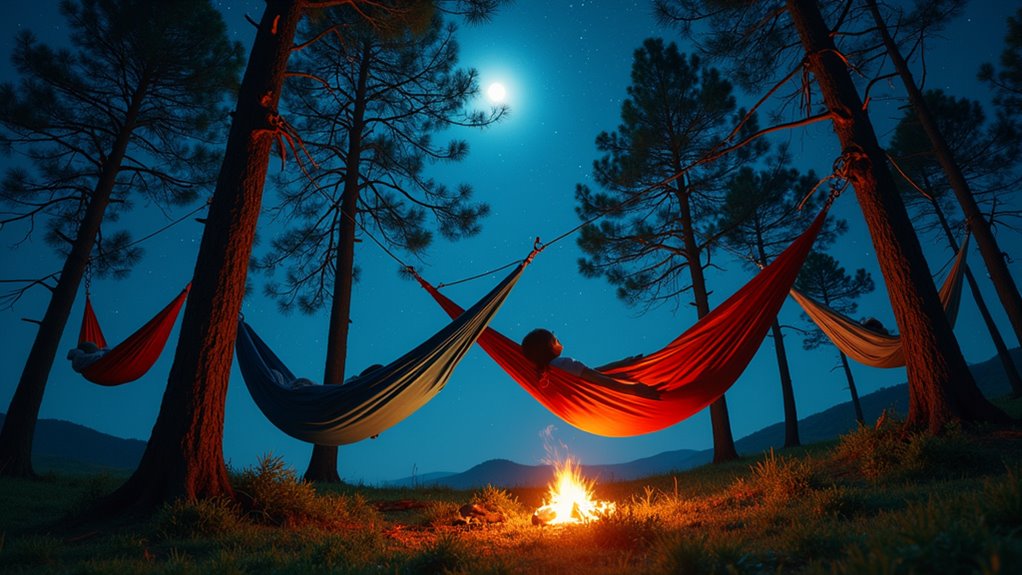
When you’re tired of cramped tents and rocky ground, consider creating a hammock village with your camping crew. You’ll need sturdy trees spaced 12-15 feet apart and basic hammocks that won’t break your budget. Dollar store tarps work perfectly as rain flies when strung above each hammock.
Set up your village in a circle or line formation, keeping hammocks close enough for easy conversation but far enough to avoid midnight collisions.
Position your hammocks strategically—close enough to chat with neighbors, distant enough to prevent sleepy campers from bumping into each other.
Bring lightweight sleeping bags rated for nighttime temperatures, since you’ll lose ground insulation.
Pack a headlamp for each person and designate a central area for gear storage. This setup eliminates tent zippers, provides better ventilation, and creates an instant community vibe that transforms your camping experience into something magical. The key to enjoying restful nights in your hammock village is choosing comfortable camping hammocks that provide proper support throughout the night.
Transform your campsite into an interactive puzzle playground by designing clues that use natural landmarks, hidden objects, and team challenges. You’ll spend minimal money while creating maximum entertainment for your camping group.
Start by mapping your campsite and identifying unique features like distinctive trees, rock formations, or stream crossings. Create riddles that lead participants from one location to another. Hide waterproof containers with puzzle pieces, coded messages, or small trinkets you’ve brought from home.
Design challenges that require teamwork – building a specific structure with sticks, creating fire without matches, or identifying local wildlife from photos. Set a time limit and offer a simple reward like first dibs on s’mores ingredients. These innovative camping hacks can transform an ordinary trip into an unforgettable adventure that every camper should experience. Your fellow campers will remember this creative adventure long after returning home.
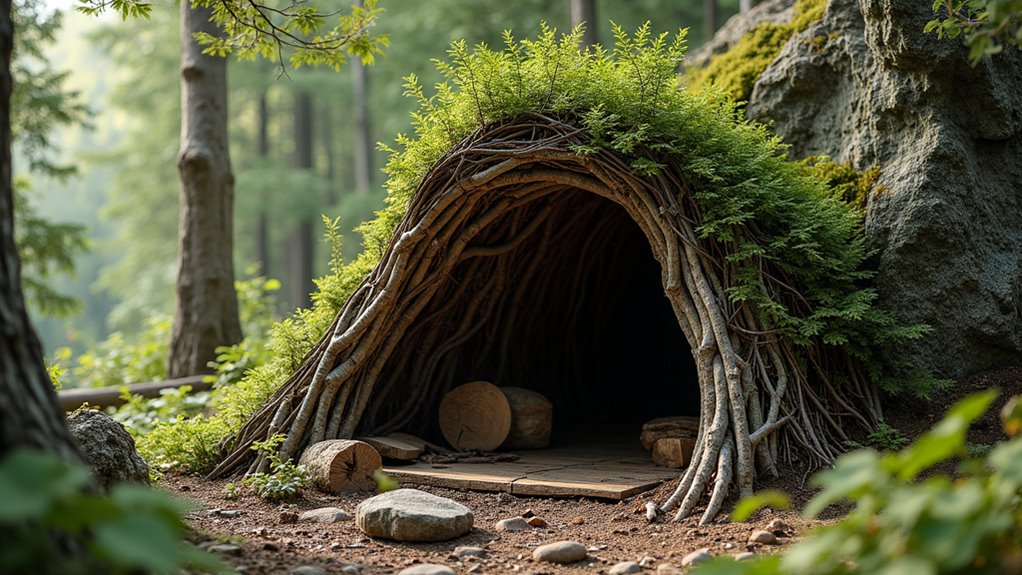
Although modern camping gear offers convenience, mastering the art of natural shelter construction connects you to essential survival skills while saving money on expensive equipment.
Start with a debris hut by creating an A-frame using fallen branches. Pack leaves, pine needles, and moss between the framework for insulation. You’ll stay surprisingly warm without spending a dime on gear.
For quick protection, lean sturdy branches against a large tree or rock face, then weave smaller branches horizontally through the frame. Fill gaps with natural materials like bark strips or dried grass.
Always choose elevated, dry ground and ensure your entrance faces away from prevailing winds.
Practice this skill during fair weather so you’re prepared when conditions turn challenging.
These natural shelter techniques are perfect to practice while bushwalking in Australia’s diverse wilderness areas where you can find abundant materials and test your skills safely.
Since our devices constantly demand attention, a technology-free camping weekend offers rare mental clarity that’s impossible to find at home. You’ll need to inform family and friends beforehand, then power down everything except emergency communication.
Pack analog entertainment: books, cards, board games, and journals. Bring a physical map instead of GPS, and use a traditional compass for navigation. A manual can opener and non-electric cooking tools become essential.
Without screens distracting you, you’ll notice sounds you normally miss—bird calls, rustling leaves, crackling fires. Your sleep quality improves dramatically without blue light exposure.
Start conversations with fellow campers, practice sketching nature, or simply sit quietly. This budget-friendly approach costs nothing extra while delivering mental benefits that expensive wellness retreats charge hundreds for.
When breaking camp, follow Leave No Trace principles to ensure you don’t leave anything behind for future campers to discover.
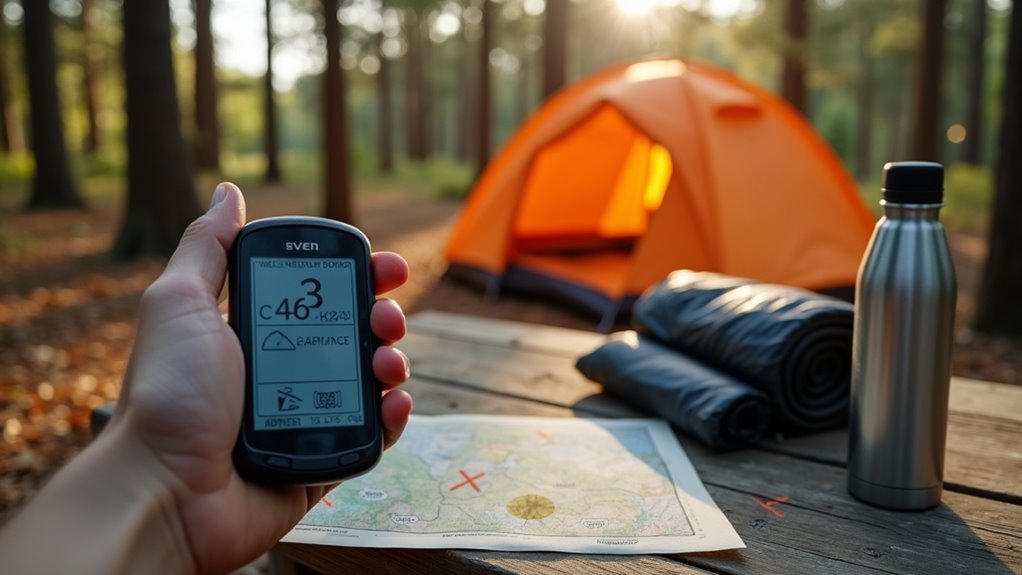
While unplugging from technology offers profound benefits, you can also harness GPS in a purposeful way that gets you exploring nature through geocaching. This modern treasure hunting game uses coordinates to guide you to hidden containers called caches.
Most camping areas have nearby geocaches waiting to be discovered. Download a free geocaching app before your trip, then search for caches within hiking distance of your campsite. You’ll need basic supplies like a pen to sign logbooks and small trinkets for trading.
Many caches contain inexpensive toys, coins, or keepsakes left by previous finders. Geocaching transforms ordinary walks into exciting adventures while teaching navigation skills.
It’s particularly engaging for families with kids who need extra motivation to explore outdoors. If you’re planning a camping trip near water, consider whether renting or buying a boat could enhance your geocaching adventures by accessing waterside caches.
Why settle for crowded campgrounds when you can pitch your tent in extraordinary spots that cost nothing extra? Beach camping offers stunning sunrises and the sound of waves as your alarm clock. Just check local regulations first – many beaches allow overnight camping with permits.
Urban rooftop camping transforms city adventures, giving you skyline views without hotel costs.
Before choosing unconventional spots, consider these essentials:
Scout locations during daylight to identify potential hazards like unstable surfaces or tide changes. Bring extra stakes for sandy or hard surfaces, and always have a backup plan if conditions change unexpectedly. While these unique locations offer adventure year-round, winter campsite selection requires additional considerations for cold weather conditions and seasonal accessibility.
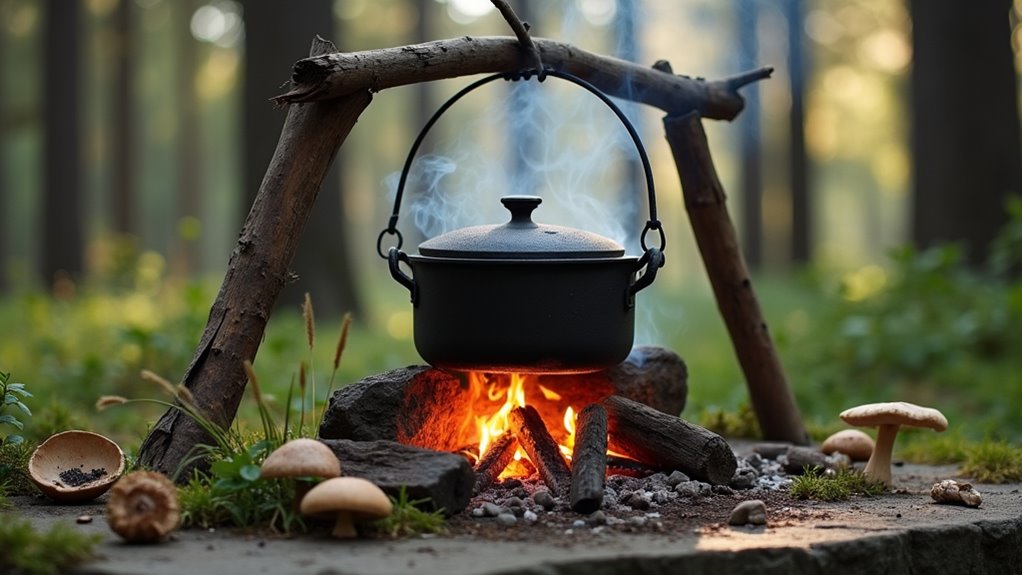
When you’re miles from the nearest outlet, mastering fire-based cooking transforms your camping meals from bland to brilliant without spending a dime on fancy gear.
Start with rock cooking—heat flat stones in your fire, then cook meat and vegetables directly on the hot surface.
Rock cooking delivers perfectly seared proteins and caramelized vegetables using nothing but heated stones from your campfire.
Create makeshift grills using green branches or metal grates from old appliances.
Wrap food in large leaves like banana or burdock for natural steaming packets.
Build a simple reflector oven with aluminum foil and rocks to bake bread or fish.
Master ember cooking by burying potatoes and corn in hot coals.
Remember to maintain proper hydration levels throughout your cooking sessions, as working near fire and hot surfaces can quickly dehydrate you during outdoor adventures.
These techniques don’t just save money—they’ll connect you with centuries-old survival skills while creating unforgettable outdoor dining experiences.
How can you turn your camping trip into an engaging adventure that costs nothing but creates lasting memories? Organize a multi-day photography scavenger hunt that’ll keep everyone excited and exploring. Create a list of items, wildlife, or scenes for participants to photograph throughout your trip. You’ll discover hidden gems around your campsite while building friendly competition among fellow campers.
Set up your hunt with these essential elements:
Use smartphones or basic cameras to keep costs down. This activity encourages exploration, teaches photography skills, and creates a fantastic collection of trip memories everyone can share. After your photography adventures, refuel with easy camping meals that require minimal preparation time.
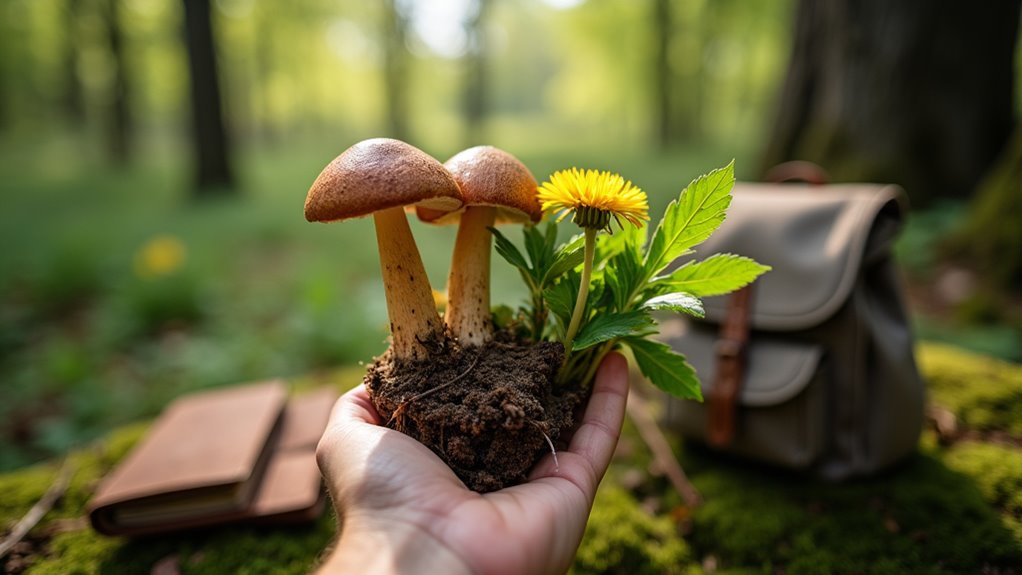
Since foraging connects you directly with nature’s pantry, it transforms an ordinary camping trip into an educational adventure that won’t cost you a dime. Start by downloading free plant identification apps like PlantIn or iNaturalist before you leave home.
Focus on easily recognizable edibles like dandelions, wild garlic, or blackberries first. Always follow the “rule of 100%” – if you’re not completely certain about a plant’s identity, don’t eat it. Bring a magnifying glass and field guide for backup verification.
Practice the sustainable “one-third rule” by taking only what you need while leaving plenty for wildlife and regeneration. Document your finds with photos to build your foraging knowledge base for future camping adventures.
When planning your foraging expedition, make sure to pack your essential gear alongside your camping equipment to ensure you’re properly prepared for both activities.
While traditional camping offers relaxation, creating your own survival challenge course transforms your campsite into an exciting training ground that costs nothing but imagination. You’ll design obstacles using natural materials around you – fallen logs become balance beams, rocks create stepping stone challenges, and trees provide anchor points for rope courses.
Start with these core elements:
Set time limits for each station and track your progress. You can increase difficulty by adding weather constraints or limiting tools.
This approach sharpens essential outdoor skills while keeping entertainment costs at zero, making every camping trip both educational and thrilling. Unlike RV camping where you’re confined to prepared amenities, tent camping allows you the flexibility to spread your challenge course across a wider area and truly learn about the natural environment.
You’ll spend hundreds on fancy gear to “get back to nature,” then realize the best camping memories come from free activities like building forts with sticks and sleeping under open sky. While you’re researching expensive gadgets online, you’re missing the sunset happening right outside your window. Pack light, spend less, and discover that disconnecting from your wallet might be the best way to reconnect with the wilderness you’re actually seeking.